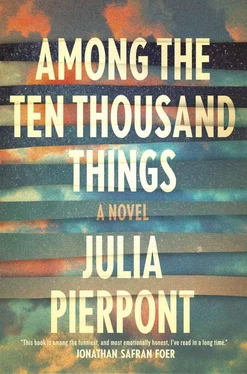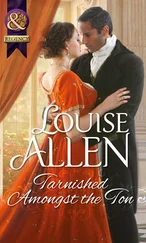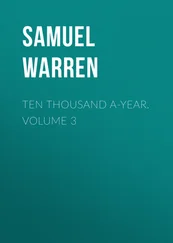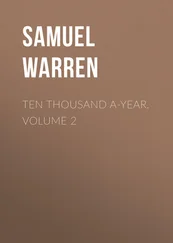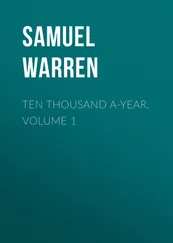—
So only Gary slept, or was presumed asleep, who could say.
“Mother.” Jack could feel Phyllis idling behind the front door, unsure. He’d parked the car midway up the drive and stopped to pluck a yellowy green clover, three leafed, from a seam in the pavement. Now, among the guardian mallards of the porch, he looked up and down, past hedges, across striped fields of grass, where lawn mowers ghosted pale ribbons, for the first stirrings of neighborhood watch. “It’s me. It’s Jack. I’m outside.”
“Jackie?” The locks came undone, and the front hall revealed itself in pieces, new ivory bookends bearing up the same old books, and his mother, thinner, hair more black, inky, like she’d taken a Magic Marker to it. Didn’t anyone tell her how ridiculous it looked? Someone should tell her. Charles.
“Mother, you look well.”
Phyllis said it was such a surprise to see him, and come in, Jackie, what are you doing here? Would you like a drink? Something? Charles, he’s out — you know he goes to church to get everything ready. Will you come to service? Well, sit down.
“My, but it’s a surprise.”
She called questions to him from the kitchen, where she never let anyone. Only Charles now had been granted access, every few weeks, to make his storied and bland jambalaya, which he packed into Tupperware and kept too long in the freezer.
No, Jack was not coming from New York. Tempe, in Arizona. I know you know where Tempe is. Yes, just passing through. No, Tempe isn’t so close to Houston. New York’s fine. Deb’s fine. The kids.
Phyllis came into the living room with heavy crystal glasses trembling, tonic water over ice. Charles had gotten her off drinking, and tonic was the only thing she’d touch. Said everything else tasted like kid stuff. She went back again and brought out a saucer of saltines.
“Now, when are you going back?”
“I just got here, Mother.”
“Oh, don’t be bad,” she said, sitting on the opposite end of the new blue-and-white-striped sofa and crossing her birdy legs. “It’s only I wish you’d called ahead. And things with Deborah?”
“Everything is excellent. You make it like I can’t come here—”
“Don’t be ridiculous—”
“ Like I can’t come here without something being wrong. You make it this great imposition. When I thought it would be a nice visit.”
“I only wanted to know how much to buy at the market.”
“I don’t need anything. If I need something, I’ll go out and get it myself.”
“Should I make up the guest?” She held her drink out in front of her face like a boxing glove, like it was her chin that was made of glass.
“I’ll stay in my room.”
Jack ate a cracker and watched Phyllis watch for crumbs. He held the plate out to her, knowing she wouldn’t take any. His mother had started out beautiful and had stayed that way, pin thin, all through Jack’s childhood. The general consensus back then, which she’d encouraged, was that Phyllis Shanley was a woman of remarkable self-possession.
It didn’t have anything to do with restraint, though. It was never about not doing exactly what she wanted. Food simply didn’t hold any interest for her, and she’d subsisted, through age seventy-five, on a mostly liquid diet.
“Well of course we are so glad to have you, Jackie, just surprised.”
—
In a house perpetually renovated, so much history sanded down and refinished, it almost passed as a show of tenderness that Jack’s old room had gone untouched. Almost passed as proof that the child was missed. Almost, but didn’t.
Jack could hear how it didn’t in the breaking sound the door made, unsticking from its frame as though the two had grown together, fused into wall. In the room he could smell how much it didn’t, could taste it in the mildewed air. The difference between what’s kept and what’s left. Jack’s room had been left. Not saved but cordoned off.
He stood staring at an old poster over the bed, an illustration of an airplane in a mass of white clouds, Mick Jagger’s mouth tattooed on the tail, his tongue out at you, AMERICAN TOUR 1972. There was not much to look at besides. The bed itself seemed miniature. The quilt flattened and thinned and its paisley swirls, kidneys in utero, flat too, another pattern he knew by heart.
When the hour came for Phyllis to have her bath, Jack pussyfooted into the kitchen and ferreted out the twisted sleeve of saltines from a cabinet over the sink. He ate them in the new blue-and-white chair that matched the sofa and let his eyes glaze over a week-old Chronicle on the end table.
When the garage door hummed open in back of the house, the floor and every wall hummed with it. Jack recrossed his legs and continued to scan the articles, one hand sliding the remaining four crackers into his mouth and tucking the plastic sleeve, half-folded, into his pants pocket. When the back door opened, Jack was inspecting newspaper columns, the shapes of them, like bar charts.
“Hello, Jack.”
The old man in the foyer, holding a canvas bag up high against his chest so that it seemed a schoolboy’s lunch, or a hat he’d taken off to be polite, this man lived here.
“Hi,” Jack answered, the hard h hurling observable crumbs through the air. He stood and shook Charles’s hand. “Guess you’re wondering what I’m doing here.”
“I suppose those are your longhorns outside the house.” Charles was a few years younger than Phyllis, seventy-two, seventy-three — Jack didn’t know exactly — but he seemed older than everyone, than Father Time. His questions weren’t questions but assessments he’d made, data to confirm, grimly. God could make a man that way. Put God behind a man and he thinks he knows everything.
“I guess you’re surprised to see me,” Jack tried again.
“Your mother phoned up at the church.”
“Did she?” Jack imagined his mother upstairs, frenzied over her adult son, calling her new old husband, the Prophet. No, Charles, she’d have whispered , I have no idea what for. “I hope I’m not a bother to you two.”
“It isn’t that, that you would be a bother.” If it were possible to have taut jowls, that was what Charles had. They were broad and smooth, like Droopy Dog’s. His skin was pink and looked impossible to shave, it was so dry. Skin that cut easily, would bleed a lot, if Charles weren’t drained already.
“Well, I’m sure you all have your routine that I’m upsetting.”
“Suppose we sit down after dinner and have a talk.”
Jack didn’t suppose he could say no.
From the plain and spoon-shaped, Kay sifted out the kind that looked like fish, with wide-open eyes and painted scales. Also the feathered ones, hot pink and yellow, which felt soft skimming her cheek. (“Gross,” said Simon.) She’d been sitting, hunched, beside the cooler at the front of the boat, cataloging Gary’s lures as they rode further into the blurred blue. She arranged them by type, by color, by which would make the best dangly earring.
Simon pressed his finger against one of the silver barbs, umbrellaed into three points. “I thought we were using worms.”
“Oh, yucko,” Deb said, yawning from under Gary’s hat. “Be glad we aren’t.”
“Clouds are high today.” Gary, at the motor, had begun to broadcast mysterious things about the weather, casting his words across the water.
Kay looked up, hands shading her eyes. It still looked like sky, but she could see how high clouds might be preferable to lower, hanging ones. Because, if it rained, the drops would not reach them, or would not hit so hard when they did. Or because high clouds left more room for the air, for it to blow around.
Читать дальше
